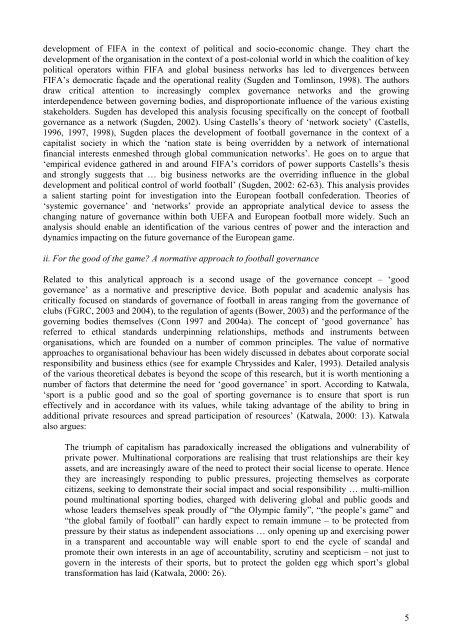Section 1:Chapter 1.Theoretical perspectives‘<strong>Governance</strong>’ <strong>and</strong> <strong>the</strong> football <strong>in</strong>dustryCrucial to an underst<strong>and</strong><strong>in</strong>g <strong>of</strong> <strong>the</strong> governance <strong>of</strong> <strong>the</strong> football <strong>in</strong>dustry, <strong>and</strong> <strong>UEFA</strong>’s role with<strong>in</strong> it isan <strong>in</strong>itial underst<strong>and</strong><strong>in</strong>g <strong>of</strong> wider mean<strong>in</strong>g <strong>of</strong> ‘governance’. The term ‘governance’ has provedparticularly difficult to def<strong>in</strong>e because <strong>of</strong> <strong>the</strong> many <strong>and</strong> divergent contexts <strong>in</strong> which it is used. Itcomes from <strong>the</strong> Lat<strong>in</strong> word mean<strong>in</strong>g to ‘steer’ or ‘give directions’. The concept is now <strong>in</strong>creas<strong>in</strong>glyused, not only <strong>in</strong> a political context, but also alongside a range <strong>of</strong> organisations <strong>in</strong>clud<strong>in</strong>g publicauthorities, private companies <strong>and</strong> corporations, voluntary organisations, <strong>and</strong> public bodies.<strong>Governance</strong> has been studied <strong>in</strong> a wide range <strong>of</strong> contexts, <strong>in</strong>clud<strong>in</strong>g: political science (Leach <strong>and</strong>Percy-Smith, 2001, Newman, 2001, Pierre <strong>and</strong> Peters, 2000); public policy (Goss, 2001, Rhodes,1997, Richards <strong>and</strong> Smith, 2002); <strong>and</strong> <strong>in</strong>ternational relations (Clark, 1999, Rosenau <strong>and</strong> Czempiel,1992). Def<strong>in</strong>itions <strong>of</strong> governance have essentially been divided <strong>in</strong>to two areas: an analytical <strong>and</strong>explanatory use <strong>of</strong> <strong>the</strong> concept on <strong>the</strong> one h<strong>and</strong>, <strong>and</strong> a normative <strong>and</strong> prescriptive use <strong>of</strong> <strong>the</strong> term on<strong>the</strong> o<strong>the</strong>r.i. Network football: an analytical approach to football governanceFor Rhodes, governance signifies ‘a change <strong>in</strong> <strong>the</strong> mean<strong>in</strong>g <strong>of</strong> government, referr<strong>in</strong>g to a newprocess <strong>of</strong> govern<strong>in</strong>g; or a changed condition <strong>of</strong> ordered rule; or <strong>the</strong> new method by which societyis governed’ (1996: 652-3). This analytical def<strong>in</strong>ition has been adapted <strong>and</strong> applied to <strong>the</strong> analysis<strong>of</strong> <strong>the</strong> governance <strong>of</strong> sport. H<strong>in</strong>dley for example, argues that ‘governance recognises that no s<strong>in</strong>gleactor has <strong>the</strong> capacity to control a diverse field <strong>of</strong> actions <strong>and</strong> <strong>in</strong>teractions, flagg<strong>in</strong>g up new forms <strong>of</strong>govern<strong>in</strong>g, such as co-operation <strong>and</strong> partnerships’ (H<strong>in</strong>dley, 2002). Similarly, Foster has argued that<strong>the</strong>re has been an ‘erosion <strong>of</strong> sport<strong>in</strong>g autonomy’ (Foster, 1993). Thus, ‘governance’ implies a‘network’, <strong>and</strong> is used as an analytical tool which ‘focuses on relations between organisations,<strong>the</strong>reby imply<strong>in</strong>g that policy emerges as a result <strong>of</strong> barga<strong>in</strong><strong>in</strong>g between organisations ra<strong>the</strong>r than aresult <strong>of</strong> authoritative decision-mak<strong>in</strong>g by a s<strong>in</strong>gle actor or <strong>in</strong>stitution (H<strong>in</strong>dley, 2002). This view <strong>of</strong>governance <strong>in</strong> sport <strong>in</strong> also forwarded by Henry <strong>and</strong> Lee, which <strong>the</strong>y refer to as ‘systemicgovernance’ (Henry <strong>and</strong> Lee, 2004). Environments are characterised by <strong>the</strong> ‘<strong>in</strong>teraction <strong>of</strong>organisations’ <strong>and</strong> ‘groups work<strong>in</strong>g with<strong>in</strong> <strong>and</strong> across organisations. Sport, <strong>the</strong>y suggest, is noexception, <strong>and</strong> is concerned with ‘<strong>the</strong> competition, co-operation, <strong>and</strong> mutual adjustment betweenorganisations <strong>in</strong> such systems’ (Henry <strong>and</strong> Lee, 2004: 26). The authors contend that, <strong>in</strong> sport, as <strong>in</strong>o<strong>the</strong>r govern<strong>in</strong>g environments, systemic governance is part <strong>of</strong> <strong>the</strong> nature <strong>of</strong> globalis<strong>in</strong>g trends,emphasis<strong>in</strong>g a shift from ‘government’ to ‘governance’. They argue that ‘a pr<strong>of</strong>ound shift has takenplace <strong>in</strong> <strong>the</strong> way <strong>in</strong> which sport is managed <strong>in</strong> <strong>the</strong> national <strong>and</strong> <strong>in</strong>ternational context. This shift isencapsulated <strong>in</strong> <strong>the</strong> move from direct control or government <strong>of</strong> sport to a governance <strong>of</strong> sportapproach’ (Henry <strong>and</strong> Lee, 2004: 38). In football this means that <strong>the</strong> hierarchy <strong>of</strong> governance, hasbeen replaced by governance network, characterised by a multiplicity <strong>of</strong> organisations operat<strong>in</strong>g <strong>in</strong>a complex comb<strong>in</strong>ation <strong>of</strong> legal, regulated <strong>and</strong> self-regulatory frameworks, <strong>in</strong> which it is impossibleto see <strong>the</strong> govern<strong>in</strong>g bodies as sole authors <strong>of</strong> <strong>the</strong>ir sports’ futures: ‘<strong>the</strong> old hierarchical model <strong>of</strong> <strong>the</strong>government <strong>of</strong> sport, <strong>the</strong> top-down system, has given way to a complex web <strong>of</strong> <strong>in</strong>terrelationshipsbetween stakeholders <strong>in</strong> which different groups exert power <strong>in</strong> different ways <strong>and</strong> <strong>in</strong> differentcontexts by draw<strong>in</strong>g on alliances with o<strong>the</strong>r stakeholders’(Henry <strong>and</strong> Lee, 2004: 27). Theimplications <strong>of</strong> this are that significant change can only be achieved through negotiation betweenstakeholders, <strong>and</strong> that govern<strong>in</strong>g bodies no longer control by dictat<strong>in</strong>g policy outcomes, but mustshape <strong>and</strong> cajole <strong>in</strong> order to achieve desired objectives.In football, <strong>the</strong>re has been some organisational analysis <strong>of</strong> <strong>the</strong> govern<strong>in</strong>g bodies, <strong>the</strong>environments <strong>in</strong> which <strong>the</strong>y operate, <strong>the</strong>ir future role <strong>and</strong> <strong>in</strong>fluence, <strong>and</strong> <strong>the</strong> impact <strong>of</strong> <strong>the</strong>ir<strong>in</strong>teraction with <strong>the</strong> environment <strong>in</strong> which <strong>the</strong>y operate (Holt, Michie <strong>and</strong> Oughton, 2003; FGRC,2003 <strong>and</strong> 2004). In <strong>the</strong>ir sem<strong>in</strong>al critical sociology <strong>of</strong> FIFA, Sugden <strong>and</strong> Toml<strong>in</strong>son assess <strong>the</strong>4
development <strong>of</strong> FIFA <strong>in</strong> <strong>the</strong> context <strong>of</strong> political <strong>and</strong> socio-economic change. They chart <strong>the</strong>development <strong>of</strong> <strong>the</strong> organisation <strong>in</strong> <strong>the</strong> context <strong>of</strong> a post-colonial world <strong>in</strong> which <strong>the</strong> coalition <strong>of</strong> keypolitical operators with<strong>in</strong> FIFA <strong>and</strong> global bus<strong>in</strong>ess networks has led to divergences betweenFIFA’s democratic façade <strong>and</strong> <strong>the</strong> operational reality (Sugden <strong>and</strong> Toml<strong>in</strong>son, 1998). The authorsdraw critical attention to <strong>in</strong>creas<strong>in</strong>gly complex governance networks <strong>and</strong> <strong>the</strong> grow<strong>in</strong>g<strong>in</strong>terdependence between govern<strong>in</strong>g bodies, <strong>and</strong> disproportionate <strong>in</strong>fluence <strong>of</strong> <strong>the</strong> various exist<strong>in</strong>gstakeholders. Sugden has developed this analysis focus<strong>in</strong>g specifically on <strong>the</strong> concept <strong>of</strong> footballgovernance as a network (Sugden, 2002). Us<strong>in</strong>g Castells’s <strong>the</strong>ory <strong>of</strong> ‘network society’ (Castells,1996, 1997, 1998), Sugden places <strong>the</strong> development <strong>of</strong> football governance <strong>in</strong> <strong>the</strong> context <strong>of</strong> acapitalist society <strong>in</strong> which <strong>the</strong> ‘nation state is be<strong>in</strong>g overridden by a network <strong>of</strong> <strong>in</strong>ternationalf<strong>in</strong>ancial <strong>in</strong>terests enmeshed through global communication networks’. He goes on to argue that‘empirical evidence ga<strong>the</strong>red <strong>in</strong> <strong>and</strong> around FIFA’s corridors <strong>of</strong> power supports Castells’s <strong>the</strong>sis<strong>and</strong> strongly suggests that … big bus<strong>in</strong>ess networks are <strong>the</strong> overrid<strong>in</strong>g <strong>in</strong>fluence <strong>in</strong> <strong>the</strong> globaldevelopment <strong>and</strong> political control <strong>of</strong> world football’ (Sugden, 2002: 62-63). This analysis providesa salient start<strong>in</strong>g po<strong>in</strong>t for <strong>in</strong>vestigation <strong>in</strong>to <strong>the</strong> European football confederation. Theories <strong>of</strong>‘systemic governance’ <strong>and</strong> ‘networks’ provide an appropriate analytical device to assess <strong>the</strong>chang<strong>in</strong>g nature <strong>of</strong> governance with<strong>in</strong> both <strong>UEFA</strong> <strong>and</strong> European football more widely. Such ananalysis should enable an identification <strong>of</strong> <strong>the</strong> various centres <strong>of</strong> power <strong>and</strong> <strong>the</strong> <strong>in</strong>teraction <strong>and</strong>dynamics impact<strong>in</strong>g on <strong>the</strong> future governance <strong>of</strong> <strong>the</strong> European game.ii. For <strong>the</strong> good <strong>of</strong> <strong>the</strong> game? A normative approach to football governanceRelated to this analytical approach is a second usage <strong>of</strong> <strong>the</strong> governance concept – ‘goodgovernance’ as a normative <strong>and</strong> prescriptive device. Both popular <strong>and</strong> academic analysis hascritically focused on st<strong>and</strong>ards <strong>of</strong> governance <strong>of</strong> football <strong>in</strong> areas rang<strong>in</strong>g from <strong>the</strong> governance <strong>of</strong>clubs (FGRC, 2003 <strong>and</strong> 2004), to <strong>the</strong> regulation <strong>of</strong> agents (Bower, 2003) <strong>and</strong> <strong>the</strong> performance <strong>of</strong> <strong>the</strong>govern<strong>in</strong>g bodies <strong>the</strong>mselves (Conn 1997 <strong>and</strong> 2004a). The concept <strong>of</strong> ‘good governance’ hasreferred to ethical st<strong>and</strong>ards underp<strong>in</strong>n<strong>in</strong>g relationships, methods <strong>and</strong> <strong>in</strong>struments betweenorganisations, which are founded on a number <strong>of</strong> common pr<strong>in</strong>ciples. The value <strong>of</strong> normativeapproaches to organisational behaviour has been widely discussed <strong>in</strong> debates about corporate socialresponsibility <strong>and</strong> bus<strong>in</strong>ess ethics (see for example Chryssides <strong>and</strong> Kaler, 1993). Detailed analysis<strong>of</strong> <strong>the</strong> various <strong>the</strong>oretical debates is beyond <strong>the</strong> scope <strong>of</strong> this research, but it is worth mention<strong>in</strong>g anumber <strong>of</strong> factors that determ<strong>in</strong>e <strong>the</strong> need for ‘good governance’ <strong>in</strong> sport. Accord<strong>in</strong>g to Katwala,‘sport is a public good <strong>and</strong> so <strong>the</strong> goal <strong>of</strong> sport<strong>in</strong>g governance is to ensure that sport is runeffectively <strong>and</strong> <strong>in</strong> accordance with its values, while tak<strong>in</strong>g advantage <strong>of</strong> <strong>the</strong> ability to br<strong>in</strong>g <strong>in</strong>additional private resources <strong>and</strong> spread participation <strong>of</strong> resources’ (Katwala, 2000: 13). Katwalaalso argues:The triumph <strong>of</strong> capitalism has paradoxically <strong>in</strong>creased <strong>the</strong> obligations <strong>and</strong> vulnerability <strong>of</strong>private power. Mult<strong>in</strong>ational corporations are realis<strong>in</strong>g that trust relationships are <strong>the</strong>ir keyassets, <strong>and</strong> are <strong>in</strong>creas<strong>in</strong>gly aware <strong>of</strong> <strong>the</strong> need to protect <strong>the</strong>ir social license to operate. Hence<strong>the</strong>y are <strong>in</strong>creas<strong>in</strong>gly respond<strong>in</strong>g to public pressures, project<strong>in</strong>g <strong>the</strong>mselves as corporatecitizens, seek<strong>in</strong>g to demonstrate <strong>the</strong>ir social impact <strong>and</strong> social responsibility … multi-millionpound mult<strong>in</strong>ational sport<strong>in</strong>g bodies, charged with deliver<strong>in</strong>g global <strong>and</strong> public goods <strong>and</strong>whose leaders <strong>the</strong>mselves speak proudly <strong>of</strong> “<strong>the</strong> Olympic family”, “<strong>the</strong> people’s game” <strong>and</strong>“<strong>the</strong> global family <strong>of</strong> football” can hardly expect to rema<strong>in</strong> immune – to be protected frompressure by <strong>the</strong>ir status as <strong>in</strong>dependent associations … only open<strong>in</strong>g up <strong>and</strong> exercis<strong>in</strong>g power<strong>in</strong> a transparent <strong>and</strong> accountable way will enable sport to end <strong>the</strong> cycle <strong>of</strong> sc<strong>and</strong>al <strong>and</strong>promote <strong>the</strong>ir own <strong>in</strong>terests <strong>in</strong> an age <strong>of</strong> accountability, scrut<strong>in</strong>y <strong>and</strong> scepticism – not just togovern <strong>in</strong> <strong>the</strong> <strong>in</strong>terests <strong>of</strong> <strong>the</strong>ir sports, but to protect <strong>the</strong> golden egg which sport’s globaltransformation has laid (Katwala, 2000: 26).5
- Page 1 and 2: ISSN: 1756-8811UEFA, Governance, an
- Page 3 and 4: ContentsAcknowledgementsIntroductio
- Page 5: AcknowledgementsThis project could
- Page 8 and 9: coming to play an increasingly infl
- Page 12 and 13: So the ‘good governance’ of spo
- Page 14 and 15: Table 1: Theories of governanceTheo
- Page 16 and 17: the focal organisation will adopt a
- Page 18 and 19: different levels of the national ga
- Page 20 and 21: I think European sports are based o
- Page 22 and 23: The clubs, as the common denominato
- Page 24 and 25: mechanisms: committees, expert pane
- Page 26 and 27: It is a far cry from the simple the
- Page 28 and 29: intention of formulating a continen
- Page 30 and 31: eceived from the sale of broadcasti
- Page 32 and 33: institutions of Europe. Much of the
- Page 34 and 35: 2001: 438). However, whilst noting
- Page 36 and 37: Beckham’s progress for Real Madri
- Page 38 and 39: which UEFA itself was one of number
- Page 40 and 41: Table 2: Champions League market po
- Page 42 and 43: opportunity provided by Media Partn
- Page 44 and 45: For Hecht, the surprise was the clu
- Page 46 and 47: competition (Hamil et al, 1999; Ham
- Page 48 and 49: So to cut off revenues from bigger
- Page 50 and 51: clubs in question, their different
- Page 52 and 53: organised. 20 Analysis has correctl
- Page 54 and 55: Radnedge, commenting on the role of
- Page 56 and 57: would resolve these problematic iss
- Page 58 and 59: for a programme which includes show
- Page 60 and 61:
literature. It is the contention he
- Page 62 and 63:
Section 3:The stakeholder challenge
- Page 64 and 65:
coalition there are ‘maximalists
- Page 66 and 67:
League, rather than being drawn ent
- Page 68 and 69:
egulatory authorities will take the
- Page 70 and 71:
iii. The ‘specificity’ of sport
- Page 72 and 73:
worry very greatly that once it’s
- Page 74 and 75:
consideration for the ‘specificit
- Page 76 and 77:
and should be extended. The startin
- Page 78 and 79:
The governing bodies’ failure to
- Page 80 and 81:
in 2000 and this is reflected in th
- Page 82 and 83:
up whether it’s a meaningful prop
- Page 84 and 85:
Europe, other scenarios can be envi
- Page 86 and 87:
possibility of breakaway competitio
- Page 88 and 89:
With regard to the governance of UE
- Page 90 and 91:
Will’s contention that policy has
- Page 92 and 93:
management. The strength of this re
- Page 94 and 95:
exclusively consultative rather tha
- Page 96 and 97:
iv. The elite clubs and the G14When
- Page 98 and 99:
structure of the International Foot
- Page 100 and 101:
A lot of people think G14 is a supe
- Page 102 and 103:
at the same time, the truism that c
- Page 104 and 105:
to build on it. In the three years,
- Page 106 and 107:
the homegrown players … you hear
- Page 108 and 109:
It is very important for profession
- Page 110 and 111:
Thus it may be that co-operation wi
- Page 112 and 113:
domestic football to influence the
- Page 114 and 115:
with a four year maximum term (Darb
- Page 116 and 117:
articulated elsewhere (Sugden and T
- Page 118 and 119:
UEFA’s day-to-day involvement in
- Page 120 and 121:
good, I think it will be a hugely s
- Page 122 and 123:
diverging from those of a different
- Page 124 and 125:
It is likely that these bodies will
- Page 126 and 127:
The corporatisation of UEFA structu
- Page 128 and 129:
Chapter 7.UEFA and the structure of
- Page 130 and 131:
pressure. According to Moorhouse:
- Page 132 and 133:
Either way, the primacy of the nati
- Page 134 and 135:
extend beyond unpredictability. It
- Page 136 and 137:
iii. A two-tier Europe? Standards v
- Page 138 and 139:
problem with the present system was
- Page 140 and 141:
would be delighted by the demotion.
- Page 142 and 143:
football, and their role in the ove
- Page 144 and 145:
in European football. Does European
- Page 146 and 147:
the necessary connection of the sta
- Page 148 and 149:
Super Cup should have a role in dec
- Page 150 and 151:
ii. A two-pillared UEFA? The nation
- Page 152 and 153:
an association level so you don’t
- Page 154 and 155:
football they do not adequately rep
- Page 156 and 157:
therefore have a greater say in cal
- Page 158 and 159:
merits, there are also implicit dan
- Page 160 and 161:
protect the rights of less affluent
- Page 162 and 163:
elative input of the executive comm
- Page 164 and 165:
levels - thus ensuring solidarity a
- Page 166 and 167:
ii. Regulating the clubs: UEFA Club
- Page 168 and 169:
‘European financial control commi
- Page 170 and 171:
maximise the impact of this regulat
- Page 172 and 173:
The growth of UEFA has posed new pr
- Page 174 and 175:
Using this control of competition a
- Page 176 and 177:
Appendix 2:UEFA Champions League re
- Page 178 and 179:
Appendix 4:Club Competitions Commit
- Page 180 and 181:
6. The UEFA secretariat shall be re
- Page 182 and 183:
• to gather and exchange informat
- Page 184 and 185:
BibliographyAgnew, P. (2005), ‘Dr
- Page 186 and 187:
The Combined Code on Corporate Gove
- Page 188 and 189:
Galaskiewicz, J. and Wasserman, S.
- Page 190 and 191:
Kurth, T. (2004), ‘Message from T
- Page 192 and 193:
Pierre, J. and Peters, B. G. (2000)
- Page 194 and 195:
UEFA (2003c) Creating a Better Futu
- Page 196 and 197:
Reding, V. (2002) ‘Sport and Tele




